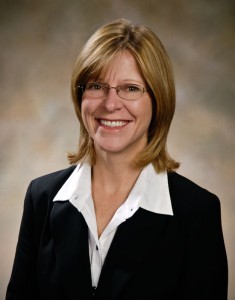
Schneider has been at Wright State University since 2000, serving as a faculty member in the Department of Psychology.
While many of her students relaxed by the pool or traveled to the beach, Wright State psychology professor Tamera Schneider, Ph.D., spent her summer amoungst the mountains of Colorado at the annual Higher Education Resource Services (HERS) Denver Summer Institute.
Offering institutes each year since 1976, HERS is the premier residential professional development program dedicated to advancing women leaders in higher education administration.
The 72 participants selected for this year’s Denver Summer Institute represented 62 institutions from 26 states across the United States and six other countries. The broad range of experiences across disciplines, sectors and positions offered a unique environment to evaluate critical issues confronting higher education today.
Responding to the current environment for higher education globally, the Summer Institute had a special focus this year on “Women Leaders Today: Accepting the Challenge of Reinventing Higher Education.” This year’s event was held at the University of Denver.
Schneider prepared for the institute by interviewing many members of Wright State’s upper administration.
“I was inspired by each of the people I met with, their commitment to WSU’s students, faculty and staff, and their passion for building our strength through championing diversity,” she said.
Schneider has been at Wright State University since 2000, serving as a faculty member in the Department of Psychology. She was previously a postdoctoral fellow at Yale University. Her recent achievements include funded collaborations across campus and various institutions aimed at uncovering the human state with remote sensors and facilitating diversity in the academy.
Her participation in the HERS Denver Summer Institute was sponsored by President David R. Hopkins and the Wright State Women’s Center.
“It was an invaluable experience,” said Schneider. “I am very grateful to President Hopkins and the Women’s Center for making this opportunity available to women on our campus. Their support for training like this speaks louder than words.”
“This opportunity is just one more example of how Wright State changes the lives of its students, faculty and staff,” she said.

 Wright State to expand nursing facilities to meet workforce needs and prepare more graduates for in-demand careers
Wright State to expand nursing facilities to meet workforce needs and prepare more graduates for in-demand careers  Wright State student-athletes make a lasting impact on local family with more to come
Wright State student-athletes make a lasting impact on local family with more to come  Wright State names Rajneesh Suri dean of Raj Soin College of Business
Wright State names Rajneesh Suri dean of Raj Soin College of Business  ‘Only in New York,’ born at Wright State
‘Only in New York,’ born at Wright State  Wright State president, Horizon League leaders welcome new commissioner
Wright State president, Horizon League leaders welcome new commissioner 